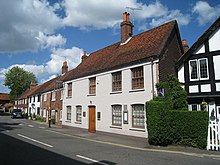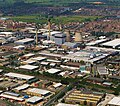Portal:Berkshire
Welcome to the Berkshire portal

The Royal County of Berkshire, commonly known as simply Berkshire (/ˈbɑːrkʃɪər, -ʃər/ ⓘ BARK-sheer, -shər; abbreviated Berks.), is a ceremonial county in South East England. It is bordered by Oxfordshire to the north, Buckinghamshire to the north-east, Greater London to the east, Surrey to the south-east, Hampshire to the south, and Wiltshire to the west. Reading is the largest settlement and the county town.
The county has an area of 1,263 km2 (488 sq mi) and a population of 911,403. The latter is concentrated in the east, the area closest to Greater London, and includes the county's largest towns: Reading (174,224) Slough (164,793), Bracknell (113,205), and Maidenhead (70,374). The west is rural, and its largest town is Newbury (33,841). For local government purposes Berkshire comprises six unitary authority areas: Bracknell Forest, Reading, Slough, West Berkshire, Windsor and Maidenhead, and Wokingham. The historic county included the parts of Oxfordshire south of the River Thames, which formed its northern border, but excluded Caversham and Slough.
The Berkshire Downs, a chalk downland and area of outstanding natural beauty, occupy the west of the county. They are the source of the River Kennet, which flows east through Newbury before meeting the Thames at Reading. The Thames then forms Berkshire's northern border, flowing past Maidenhead, before entering the county and flowing past Slough and Windsor. The south-east of the county contains Swinley Forest, a remnant of Windsor Forest now used as a forestry plantation.
There is evidence of prehistoric settlement on the Berkshire Downs, including the Iron Age Uffington White Horse, now in Oxfordshire. In the Anglo-Saxon period the region was contested by Mercia and Wessex, and Alfred the Great was born in Wantage, also now in Oxfordshire. Windsor Castle, which would become the official country residence of the British monarch, was built after the Norman Conquest. The county has been the site of several battles, particularly during the First English Civil War, when Reading and Wallingford were besieged two battles took place at Newbury, in 1643 and 1644. The proximity of the east of the county to London led to development from the nineteenth century, when Slough became an industrial centre and Bracknell was designated a new town. Software development and high-tech industry dominate the economy in the east, but the west remains an agricultural region. (Full article...)
Selected article
The Fat Duck is a fine dining restaurant in Bray, Berkshire, England, owned by the chef Heston Blumenthal. Housed in a 16th-century building, the Fat Duck opened on 16 August 1995. Although it originally served food similar to a French bistro, it soon acquired a reputation for precision and invention, and has been at the forefront of many modern culinary developments, such as food pairing, flavour encapsulation and multi-sensory cooking.
The number of staff in the kitchen increased from four when the Fat Duck first opened to 42, resulting in a ratio of one kitchen staff member per customer. The Fat Duck gained its first Michelin star in 1999, its second in 2002 and its third in 2004, making it one of eight restaurants in the United Kingdom to earn three Michelin stars. It lost its three stars in 2016, as it was under renovation, preventing it from being open for assessment. It regained all three stars in the following year.
The Fat Duck is known for its fourteen-course tasting menu featuring dishes such as nitro-scrambled egg and bacon ice cream, an Alice in Wonderland-inspired mock turtle soup involving a bouillon packet made up to look like a fob watch dissolved in tea, and a dish called Sound of the Sea which includes an audio element. It has an associated laboratory where Blumenthal and his team develop new dish concepts. In 2009, the Fat Duck suffered from the largest norovirus outbreak ever documented at a restaurant, with more than 400 diners falling ill. (Full article...)
Selected biography
Nicholas Caradoc Hoult (born 7 December 1989) is an English actor. His filmography includes supporting work in big-budget mainstream productions and starring roles in independent projects in American and British films. He has received several accolades, including nominations for a British Academy Film Award, two Golden Globe Awards, and a Primetime Emmy Award. He was included in Forbes 30 Under 30 in 2012.
Hoult performed in local theatre productions as a child. He made his screen debut at age six in the 1996 film Intimate Relations, and appeared in several television programmes. His breakthrough came with his role in the 2002 comedy-drama About a Boy. He achieved wider recognition for his performance as Tony Stonem in the E4 teen series Skins (2007–2008). His transition to adult roles began with the 2009 drama A Single Man, for which he earned a BAFTA Rising Star Award nomination, and the fantasy film Clash of the Titans (2010). He played the mutant Hank McCoy / Beast in the 2011 superhero film X-Men: First Class, a role he reprised in later instalments of the film series.
Hoult played the title role in the adventure film Jack the Giant Slayer (2013) and a zombie in the romantic comedy Warm Bodies (2013). He had a supporting role in the action film Mad Max: Fury Road (2015) and starred in a number of independent films before portraying various historical figures such as Robert Harley in the black comedy The Favourite (2018), writer J. R. R. Tolkien in Tolkien (2019), and Peter III in the Hulu comedy-drama series The Great (2020–2023). His work on the latter earned him nominations for two Golden Globes and a Primetime Emmy Award. He has since starred in the black comedy The Menu (2022).
Outside of film, Hoult voiced Elliot in the 2010 action role-playing game Fable III and appeared in the 2009 West End play New Boy. He supports the charitable organisations Teenage Cancer Trust and Christian Aid. (Full article...)
Topics
History: Battle of Reading (871) • Battle of Reading (1688) • First Battle of Newbury • Second Battle of Newbury • Siege of Reading
Geography: River Thames • Swinley Forest • The Ridgeway • Walbury Hill • Windsor Great Park
Towns: Ascot • Bracknell • Crowthorne • Earley • Eton • Hungerford • Maidenhead • Newbury • Reading • Sandhurst • Slough • Thatcham • Windsor • Wokingham • Woodley
Politics: Parliamentary constituencies • Parliamentary representation
Culture: Henley Royal Regatta • Museum of English Rural Life • Reading festival • Windsor Castle
Selected pictures
Did you know
- ... that Herbert James Gunn used a paper cut-out of Princess Elizabeth's corgi dog to help him paint his Conversation Piece at the Royal Lodge, Windsor?
- ... that comic book artist Barry Windsor-Smith wrote, drew, inked, and lettered every page of his graphic novel Monsters by himself?
- ... that today's funeral procession of Elizabeth II to Windsor Castle started at the gate to Shaw Farm?
- ... that three gasholders at the Windsor Street Gasworks were painted in the claret and blue colours of local football team Aston Villa?
Categories
Related portals
WikiProjects
Wikimedia
The following Wikimedia Foundation sister projects provide more on this subject:
-
Commons
Free media repository -
Wikibooks
Free textbooks and manuals -
Wikidata
Free knowledge base -
Wikinews
Free-content news -
Wikiquote
Collection of quotations -
Wikisource
Free-content library -
Wikiversity
Free learning tools -
Wikivoyage
Free travel guide -
Wiktionary
Dictionary and thesaurus



































